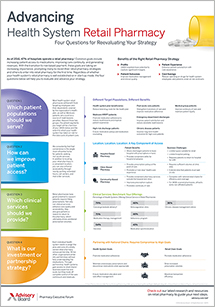Auto logout in seconds.
Continue LogoutCMS on Monday proposed a rule intended to streamline Medicare Part D's electronic prior authorization process by circumventing certain HIPAA requirements.
About the prior authorization process
According to CMS, Part D's prior authorization process requires health care providers to submit additional clinical information to verify that prescribed medications are covered under the program. CMS in a release said the requirements "promot[e] better clinical decision-making and helps ensure that patients receive medically necessary prescription drugs."
Currently, the process must comply with HIPAA, Inside Health Policy reports. According to CMS, Part D programs regulated by HIPAA currently are not permitted to complete the entire prior authorization process online, which includes prior authorization initiation requests, prior authorization responses, appeal requests, and cancelling prior authorization.
However, CMS said the Substance Use-Disorder Prevention that Promotes Opioid Recovery and Treatment for Patients and Communities Act (SUPPORT Act) granted HHS the authority to allow prior authorization standards that are not compatible with HIPAA "if such proposals are framed in consultation with stakeholders and the [National Council for Prescription Drug Plans (NCPDP)] or other standard setting organizations the [HHS secretary] finds appropriate."
Proposed rule details
CMS said the proposed rule would update Medicare Part D's e-prescribing process by adopting standards drafted by NCPDP "that ensure secure transmissions and expedite prior authorizations."
Specifically, the proposed rule would allow clinicians to choose to complete their prior authorizations online, and to begin that process during a Part D beneficiary's visit. CMS said prior authorizations completed online "typically" will "satisfy the terms of a prior authorization in real time and before a prescription is transmitted to a pharmacy."
p>CMS projected that the proposed rule, if finalized, will affect pharmacies that receive electronic prior authorization requests, prescribers who use electronic prior authorization, and electronic health record vendors. The agency estimated that it will cost affected entities about $100,000 to implement the proposed transaction updates.
The proposed changes would take effect January 2021, and all Part D plans would be required to comply with the new standards. CMS is accepting public comments on the proposed rule until August 16.
Comments
CMS said the proposed rule "would improve patients' access to needed medications" by helping to ensure that Part D beneficiaries "do not arrive at a pharmacy counter only to find that their prescription cannot be filled."
CMS Administrator Seema Verma said, "This proposed rule would reduce the time it takes for a patient to receive needed medications and ease the prescriber burden by giving clinicians the flexibility and choice to complete prior authorization transactions electronically" (Cirruzzo, Inside Health Policy, 6/17 [subscription required]; CMS release, 6/17; Paavola, Becker's Hospital Review, 6/17; Morse, Healthcare Finance News, 6/18).
Medicare 101: Cheat sheets for Parts A through D
Through the years Medicare has grown more complicated, including private supplemental insurance and prescription drug coverage. Download our cheat sheets to learn how each of the four parts of Medicare works, and why they’re so important for provider organizations:
Don't miss out on the latest Advisory Board insights
Create your free account to access 1 resource, including the latest research and webinars.
Want access without creating an account?
You have 1 free members-only resource remaining this month.
1 free members-only resources remaining
1 free members-only resources remaining
You've reached your limit of free insights
Become a member to access all of Advisory Board's resources, events, and experts
Never miss out on the latest innovative health care content tailored to you.
Benefits include:
You've reached your limit of free insights
Become a member to access all of Advisory Board's resources, events, and experts
Never miss out on the latest innovative health care content tailored to you.
Benefits include:
This content is available through your Curated Research partnership with Advisory Board. Click on ‘view this resource’ to read the full piece
Email ask@advisory.com to learn more
Click on ‘Become a Member’ to learn about the benefits of a Full-Access partnership with Advisory Board
Never miss out on the latest innovative health care content tailored to you.
Benefits Include:
This is for members only. Learn more.
Click on ‘Become a Member’ to learn about the benefits of a Full-Access partnership with Advisory Board
Never miss out on the latest innovative health care content tailored to you.


